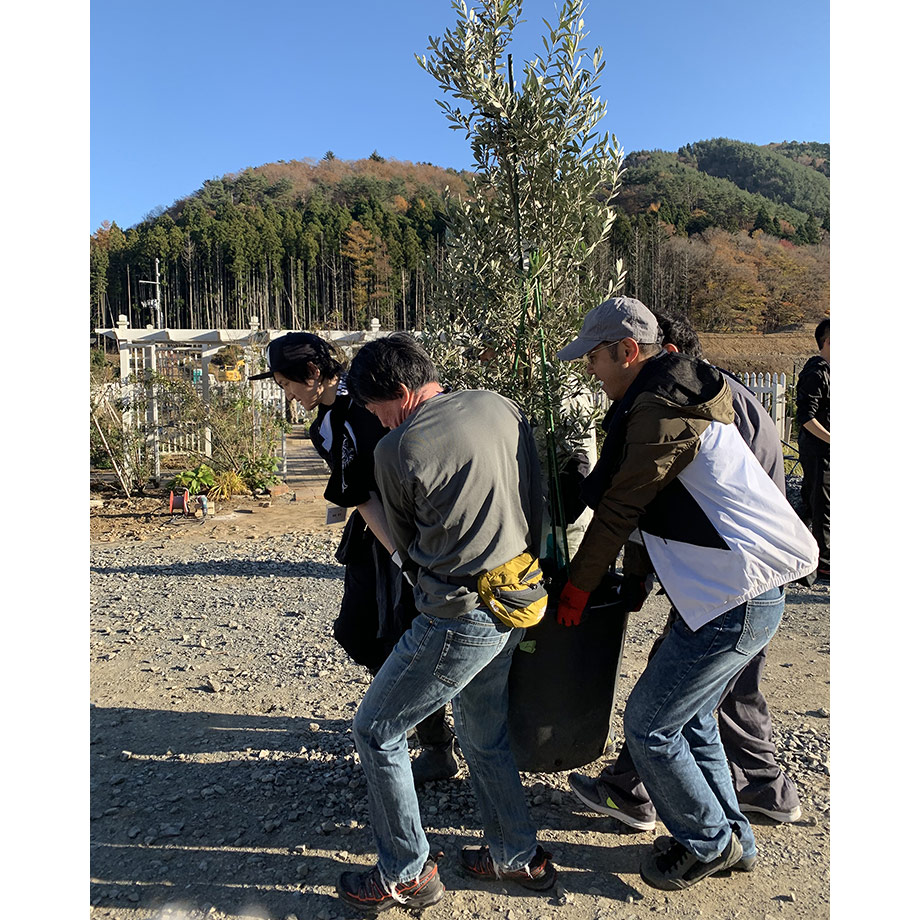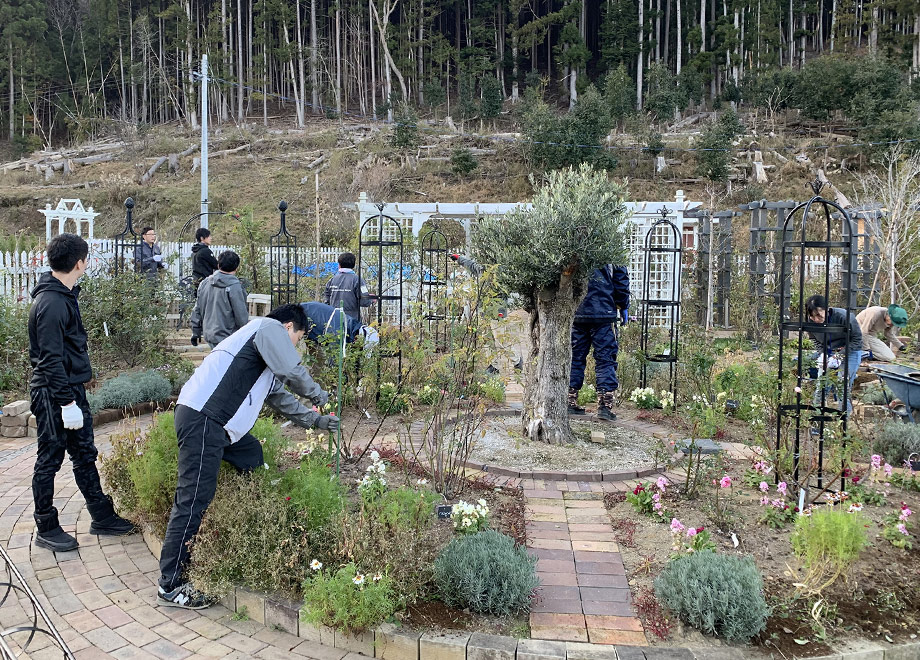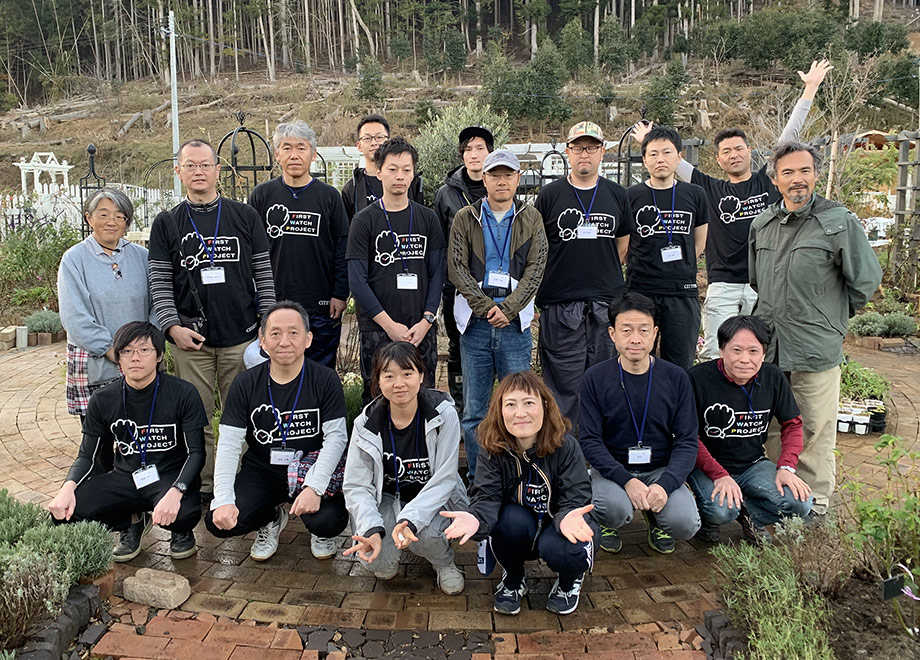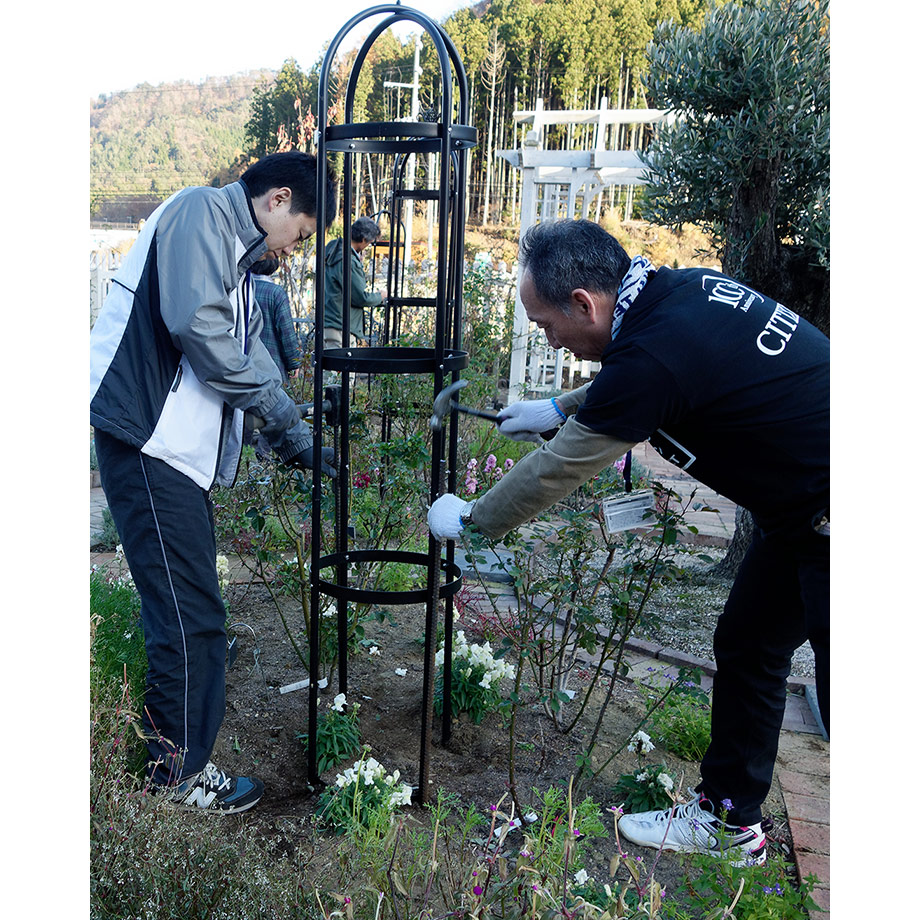Social Contribution
Sixth activity report / November 26–28, 2018
Disaster Recovery Support in Miyagi Prefecture
Our sixth activity took place in the Ogatsu district of Ishinomaki, Miyagi Prefecture. Fifteen group employees participated in activities to enhance the Ogatsu Rose Factory Garden alongside a locally active NPO called Ogatsu Hana Monogatari (“Ogatsu Flower Story”) via a nonprofit/nongovernmental organization called NICE. Participants also took a tour of group company Citizen Manufacturing's Tohoku Kitakami Factory.
More information on the activities is available on the Kahoku Shimpo Online News website.
Rose Factory Garden
Rose Factory Garden got its start in August 2011 when Rie Tokumizu, current head of Ogatsu Hana Monogatari, began planting flowers in remembrance of her family on the site of her former family home in Ogatsu, which had been buried in rubble in the tsunami that claimed their lives. The site began developing into a full-fledged garden when she later met a group from the Faculty of Horticulture at Chiba University, who had supported greening efforts in disaster-stricken areas. The project, which started as a way to pay respects to her deceased family, led to interactions that ended up forming a new community. The garden brought meaning to members' lives while providing opportunities for healthy activity.
Participants engaged in a variety of activities, including preparing the garden's olive seedlings for the winter, leveling the soil to improve drainage, and replanting lavender and other plants. Moving the olive seedlings into a greenhouse was labor-intensive, but the group managed to finish the job while taking breaks when necessary. Participants also had a chance to hear directly from Ms. Tokumizu herself, which gave them new insights into the way things were before and after the Great East Japan Earthquake as well as the current and future state of recovery efforts in the area.
Ogatsu Hana Monogatari
The city of Ishinomaki in Miyagi Prefecture suffered severe damage in the tsunami triggered by the Great East Japan Earthquake. A population census conducted six months after the disaster indicates that the population here fell by 6,511 people—more than any other municipality affected by the earthquake. There are still many disaster victims living in temporary housing still today.
The Ogatsu Hana Monogatari Project is the name for the activities that Ms. Tokumizu and her supporters did to open Rose Factory Garden on the site of her home that was destroyed by the Great East Japan Earthquake tsunami. Flowers are being planted in the hopes that garden will still be flourishing ten or twenty years from now, serving as a place where neighboring residents can gather and interact with one another.
The project also aims to restore the local area and provide a place for the local community while carrying out post-disaster greening activities, providing disaster preparedness education, growing herbs, test-growing fruit trees suited to the Ogatsu area, and more. They've especially been putting effort into growing olives, which they've named Hokugen (or “northern limit”) olives.
Finishing up the activities
Recovery is no easy task in an area that is suffering from severe depopulation. It requires everyone to have a shared passion that transcends generations and brings them together. Not to mention that people won't continue the effort unless the activities are fun and bring them joy. We also realized the importance of creating a structure that allowed people to continue moving forward without pushing themselves too hard or getting exhausted.
Rose Factory Garden is steadily being completed one step at a time with the goal of having it finished in five years. Reaching this goal will require outside support, however.




Participant feedback
- I realized that there is a power born out of people coming together with shared intention. I also learned that although restoring a town isn't something that can be done by everyday people on their own, it is tremendously important to actually go to the site and continue interacting with people. I just went as part of the support crew, but was embarrassed by the warm welcome I received. It really struck me when Ms. Tokumizu said, “We were overjoyed when people offered help after the disaster, but what we felt most strongly was that being able to give something would energize and heal us more than receiving.” I also felt that interacting with the other members of the CITIZEN Group--staying overnight and doing activities together--really helped solidify our team spirit. Meanwhile, it was refreshing to learn about the different approaches that other people in the same group took to their work. I realized what a multidimensional structure a company was. It was a real eye-opener. (Participant from the MV Manufacturing Management Department at Citizen Watch Manufacturing)
- Participating in the recovery support project broadened my perspective in so many ways. I experienced what a disaster zone is really like and how people who actually live there think--which also made me realize how important it is that I prepare myself for earthquakes as well. The Great East Japan Earthquake caused catastrophic damage, and yet it was so wonderful to see the people who were affected by it working so hard in their communities to bring people back. I'm not satisfied with just this one project, so I'm looking forward to participating in more activities when I get the chance. I was also able to interact with fellow CITIZEN Group members, which gave me a powerful sense of being part of a larger group. (Participant from the Sales Division at Citizen TIC)